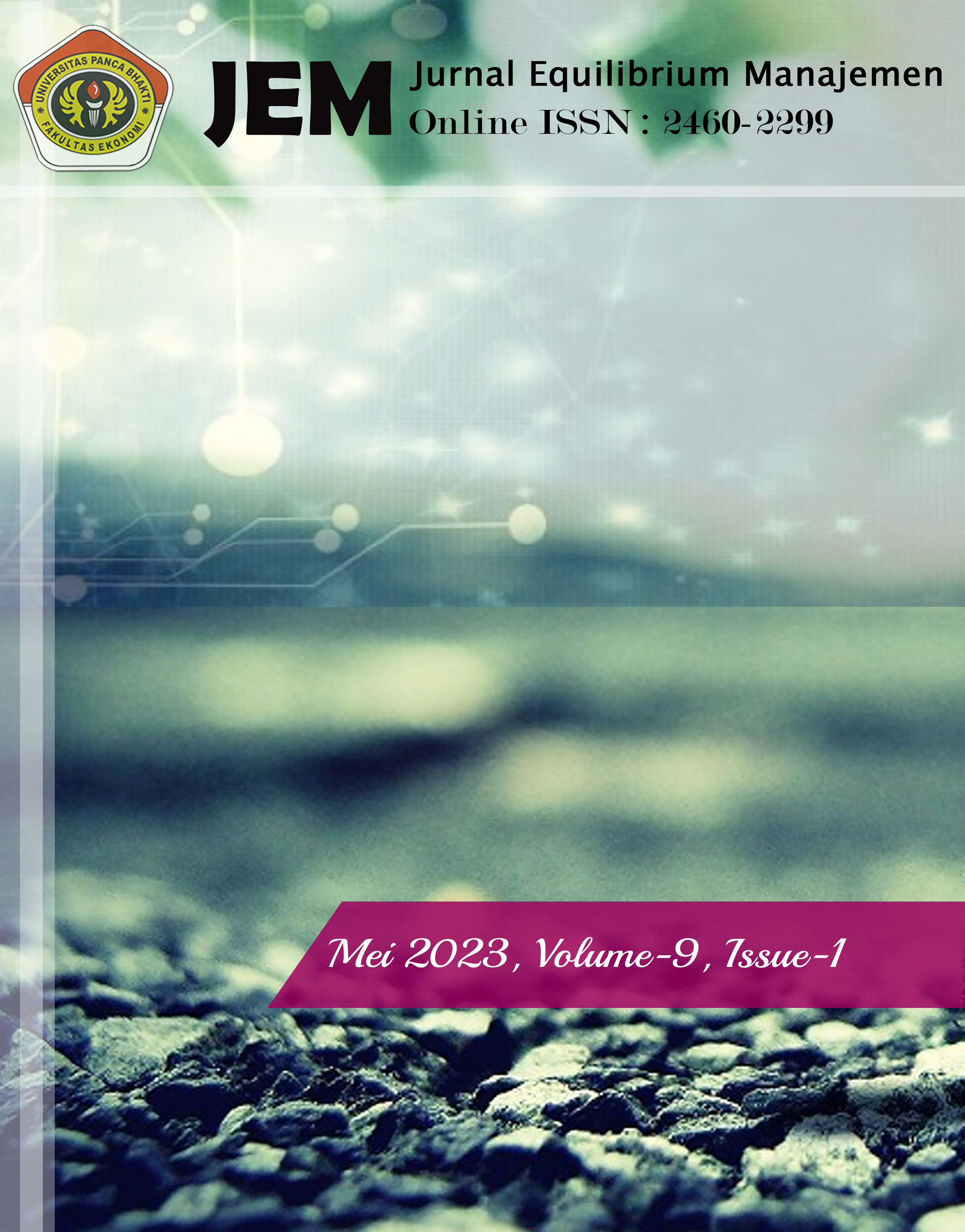Study of interest in using the Indonesian Quick Response Standard (QRIS) for MSMEs in the city of Pontianak
Main Article Content
Abstract
The utilization of recent technology for MSME players is a crucial step for building business
resilience. The initial purpose of this research is to grasp the effect of the model expansion of Unified
Theory of Technology Use Acceptance (UTAUT) and user trust in adopting digital payment system
known as Quick Response Indonesia Standard (QRIS) particularly on MSMEs actor located in
Pontianak. The aim of research is to examine the MSMEs behavioural intention in adapting the QRIS
payment system. The research methodology employed is quantitative research. Primary data is the result
from obtaining the data through answered multiple-choice questionnaire filled by the respondents.
Purposive sampling technique is selected to meet the research objectives by determine the respondents’
characteristics which is MSMEs actor that aware of QRIS payment system mechanism however remain
not utilize it. The research model will be calculated using Warp PLS 7.0 as statistical Structural
Equation Model (SEM) analysis tools. It was found that MSME actors were not influenced by social
influence in generating interest in using the QRIS payment system in business processes.
Article Details

This work is licensed under a Creative Commons Attribution-NonCommercial 4.0 International License.
Copyright (c) 2021 Jurnal Equalibrium

This work is licensed under a Creative Commons Attribution-NonCommercial 4.0 International License.
Jurnal Equalibrium is licensed under a Creative Commons Attribution-NonCommercial 4.0 International License.
References
Bhattacherjee, A. (2016). Individual Trust in Online Firms : Scale Development and Initial
Test. 19(1), 211–241.
Chairunnisa, S. M., Alfina, A., & Yasmin, A. (2020). Observing Micro, Small, and Medium
Enterprises (MSMEs) Readiness to Support Cashless Society. The Winners, 21(2), 101–
https://doi.org/10.21512/tw.v21i2.6722
Chan, S., & Asni, K. (2021). Revival approach to increase MSMEs resilience during COVID19: experience from Aceh, Indonesia. Proceedings of AICS-Social Sciences, 11, 452–
Cooper, D. R., & Schindler, P. S. (2014a). Business Research Methods (12th ed.).
Cooper, D. R., & Schindler, P. S. (2014b). Business Research Methods (12th ed.). McGrawHill.
Doosti, S., Jalilvand, M. R., Asadi, A., Khazaei Pool, J., & Mehrani Adl, P. (2016). Analyzing
the influence of electronic word of mouth on visit intention: the mediating role of
tourists’ attitude and city image. International Journal of Tourism Cities, 2(2), 137–148.
https://doi.org/10.1108/IJTC-12-2015-0031
Dwivedi, Y. K., Rana, N. P., Jeyaraj, A., Clement, M., & Williams, M. D. (2019). Reexamining the Unified Theory of Acceptance and Use of Technology ( UTAUT ):
Towards a Revised Theoretical Model. 719–734. https://doi.org/10.1007/s10796-017-
-y
Fishbein, M., & Ajzen, I. (1975). Belief, Attitude, Intention and Behavior: An Introduction to
Theory and Research. Contemporary Sociology, 6(2), 244.
https://doi.org/10.2307/2065853
Hair, J. F., Black, W. C., Babin, B. J., & Anderson, R. E. (2014). Multivariate Data Analysis,
New International Edition. Pearson.
Hair, J. F., Black, W. C., Babin, B. J., & Anderson, R. E. (2022). Multivariate Data Analysis.
Cengage Learning.
https://www.google.co.id/books/edition/Multivariate_Data_Analysis/PONXEAAAQBAJ
?hl=en&gbpv=1&dq=hair+2022+multivariate&pg=PA10&printsec=frontcover
Jayanti, P. E., & Ariyanto, D. (2019). Pengaruh Ekspektansi Kinerja, Ekspektansi Usaha,
Faktor Sosial Budaya, dan Kondisi yang Memfasilitasi pada Penerapan SIA di LPD Kota
Denpasar. E-Jurnal Akuntansi, 534. https://doi.org/10.24843/EJA.2019.v27.i01.p20
Kala’lembang, A. (2021). Digitalization in increasing SMEs productivity in the post COVID19 pandemic period. Management and Entrepreneurship: Trends of Development, 2(16),
–110. https://doi.org/10.26661/2522-1566/2021-1/16-08
Kharisma, A. M. (2023). Faktor-Faktor yang Mempengaruhi Behavior Intention Masyarakat
Gen Y dalam Menggunakan QRIS pada Berbagai Toko Ritel di Kota Batam. MAMEN
(Jurnal Manajemen), 2(1), 60–70. https://doi.org/10.55123/mamen.v2i1.1386
Musyaffi, A. M., Johari, R. J., Rosnidah, I., Sari, D. A. P., Amal, M. I., Tasyrifania, I.,
Pertiwia, S. A., & Sutanti, F. D. (2021). Digital Payment during Pandemic: An Extension
of the Unified Model of QR Code. Academic Journal of Interdisciplinary Studies, 10(6),
–223. https://doi.org/10.36941/ajis-2021-0166
Nada, D. Q., Suryaningsum, S., Kusuma, H., & Negara, S. (2021). Digitalization of the Quick
Response Indonesian Standard ( QRIS ) Payment System for MSME Development.
JICP, 4(3), 551–558.
Patil, P., Tamilmani, K., Rana, N. P., & Raghavan, V. (2020). Understanding consumer
adoption of mobile payment in India: Extending Meta-UTAUT model with personal
innovativeness, anxiety, trust, and grievance redressal. International Journal of
Information Management, 54, 102144. https://doi.org/10.1016/j.ijinfomgt.2020.102144
Prayogo, R. R., & Kusumawardhani, A. (2016). Examining Relationships of Destination
Image, Service Quality, e-WOM, and Revisit Intention to Sabang Island, Indonesia. Asia
Pacific Management and Business Application, 5(2), 85–96.
https://doi.org/10.21776/ub.apmba.2016.005.02.3
Puspitasari, A. A., Salehudin, I., Management, L., & Indonesia, U. (2022). Quick Response
Indonesian Standard ( QRIS ): Does Government Support Contribute to Cashless
Payment System Long-term Adoption ?
Putri, N. K. R. D., & Suardikha, I. M. S. (2020). Penerapan Model UTAUT 2 Untuk
Menjelaskan Niat Dan Perilaku Penggunaan E-Money di Kota Denpasar. E-Jurnal
Akuntansi, 30(2), 540. https://doi.org/10.24843/eja.2020.v30.i02.p20
Sari, D. M., Ahmad, R., & Irwansyah. (2022). Digital Literacy Readiness From The MSME
Perspective: Literature Review. RJOAS, 11(November), 51–59.
https://doi.org/10.18551/rjoas.2022-11.06
Venkatesh, V., Thong, J. Y. L., & Xu, X. (2012). Consumer Acceptance and Use of
Information Technology: Extending the Unifies Theory of Acceptance and Use of
Technology. MIS Quarterly, 36(1), 157–178.
https://doi.org/10.1109/MWSYM.2015.7167037
Wahyudin, N., Herlissha, N., & Aldiesi, D. R. (2022). The Utilization of E-Commerce and
QRIS as Digital Payment Tools to Improve Sales Performance through Competitive
Advantage in MSME. 7, 134–147.
Wardani, L. P. A. K., & Masdiantini, P. R. (2022). Pengaruh Ekspektasi Kinerja, Ekspektasi
Usaha, Faktor Sosial Budaya, Motivasi Hedonis dan Nilai Harga terhadap Minat
Penggunaan Quick Response Code Indonesian Standard (Qris). Jurnal Ilmiah Akuntansi
Dan Humanika, 12(1), 254–264.
Zhou, T. (2013). An empirical examination of continuance intention of mobile payment
services. Decision Support Systems, 54(2), 1085–1091.

